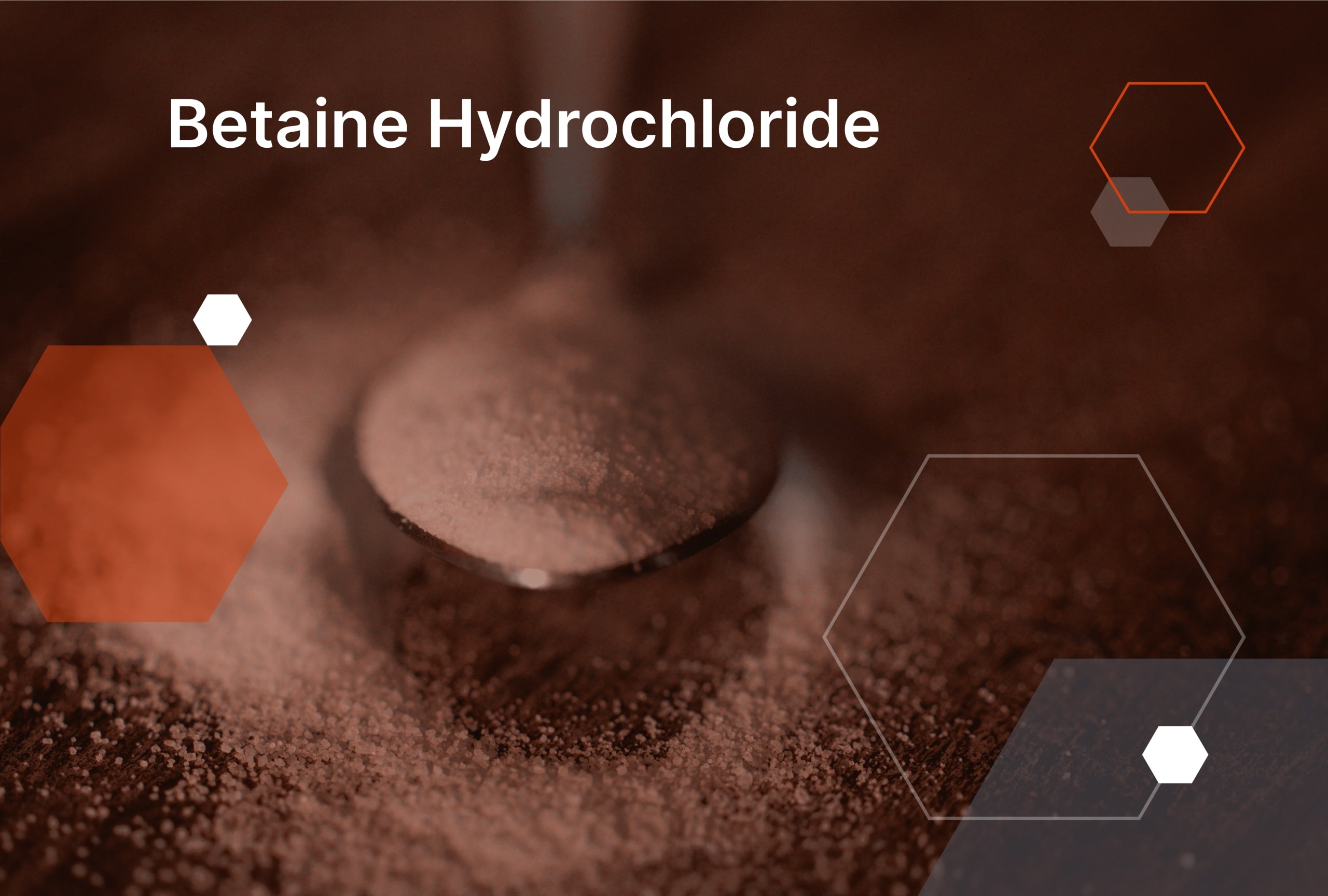
What is Betaine Hydrochloride used for?
Kemiex is an all-in-one market information, purchasing and sales platform for animal and human nutrition raw materials. In the following series of articles, we will explain the functions and uses of products that can be found in the Kemiex marketplace. On this occasion, we are going to explain the benefits of Betaine Hydrochloride:
What is Betaine Hydrochloride used for?
Betaine Hydrochloride is a dietary supplement that is commonly used to improve digestion and nutrient absorption. It is a naturally occurring compound that is found in beets, spinach, and other foods. In this article, we will explore the uses of Betaine Hydrochloride in more detail.
What are the main uses of Betaine Hydrochloride?
1. Digestive Health:
Betaine Hydrochloride works by increasing the acidity of the stomach, which can help to improve digestion. It does this by supplementing the hydrochloric acid (HCl) that is naturally produced in the stomach. This can be particularly beneficial for individuals who are deficient in HCl, which can lead to symptoms such as indigestion, bloating, and gas.
2. Nutrient Absorption:
Betaine Hydrochloride has also been shown to improve nutrient absorption, particularly for minerals such as calcium, iron, and zinc. This is because HCl is necessary for the absorption of these minerals in the digestive tract. Supplementing with Betaine Hydrochloride can help to ensure that your body is able to absorb the nutrients it needs for optimal health.
3. Athletic performance:
Betaine has been shown to improve athletic performance by increasing muscle strength and power. It may also help reduce muscle fatigue and improve recovery time after exercise.
4. Liver health:
Betaine can help support liver health by reducing the accumulation of fat in the liver and promoting healthy liver function. This can be especially beneficial for individuals with non-alcoholic fatty liver disease.
5. Other Uses:
Betaine has been shown to have antidepressant effects in some animal studies. It may also help reduce anxiety and improve cognitive function. Additionally, Betaine can help improve skin hydration and reduce the appearance of wrinkles. It may also have anti-inflammatory effects, making it beneficial for individuals with inflammatory skin conditions.
Which foods are the main sources of Betaine Hydrochloride?
Betaine Hydrochloride is typically not found in significant amounts in food sources. However, it is commonly used as a dietary supplement to support digestive health and promote nutrient absorption. Here are some examples of foods that may contain small amounts of Betaine Hydrochloride:
1. Beets: Beets are a rich source of Betaine Hydrochloride, which is also known as trimethylglycine (TMG). TMG is converted to Betaine in the body.
2. Spinach: Spinach is a good source of TMG, which can be converted to Betaine in the body.
3. Whole grains: Some whole grains, such as quinoa and wheat bran, may contain small amounts of Betaine.
4. Seafood: Some types of seafood, such as shrimp and crab, may contain small amounts of Betaine.
5. Soybeans: Soybeans and soy products may contain small amounts of Betaine.
6. Chickpeas: Chickpeas, also known as garbanzo beans, may contain small amounts of Betaine.
7. Sweet potatoes: Sweet potatoes are a good source of TMG, which can be converted to Betaine in the body.
8. Parsley: Parsley is a good source of TMG, which can be converted to Betaine in the body.
9. Cucumber: Cucumber is a good source of TMG, which can be converted to Betaine in the body.
10. Wheat germ: Wheat germ may contain small amounts of Betaine.
It is important to note that these foods do not typically contain significant amounts of Betaine Hydrochloride, which is the form of Betaine used as a dietary supplement.
What are the main benefits of Betaine Hydrochloride for animals?
Here are 5 potential benefits of Betaine Hydrochloride for animals:
1. Improved digestion: Betaine Hydrochloride can help improve digestion by increasing stomach acid production, which can help break down food and improve nutrient absorption.
2. Enhanced nutrient utilization: By improving digestion and absorption of nutrients, Betaine Hydrochloride can help animals better utilize the nutrients in their feed.
3. Reduced stress: Betaine has been shown to have anti-stress effects in animals, potentially helping them cope with stressors such as transportation or changes in environment.
4. Improved growth performance: Some studies suggest that supplementing with Betaine Hydrochloride can improve growth performance in livestock and poultry, leading to increased body weight and improved feed conversion efficiency.
5. Immune support: Betaine has been shown to have immune-boosting properties in animals, potentially helping to improve overall health and disease resistance.
It is important to note that the benefits of Betaine Hydrochloride may vary depending on the animal species and the specific circumstances of use. As with any dietary supplement, it is important to consult with a veterinarian or animal nutritionist before use.
Where to buy bulk Betaine Hydrochloride and get market information?
In Kemiex, we offer a safe and private online environment to buy and sell raw materials for the Feed, Food, Veterinary, and other life science industries. We also offer market information such as Price Trends, Trade Flows and Market News for all the micro-ingredients of the mentioned industries.